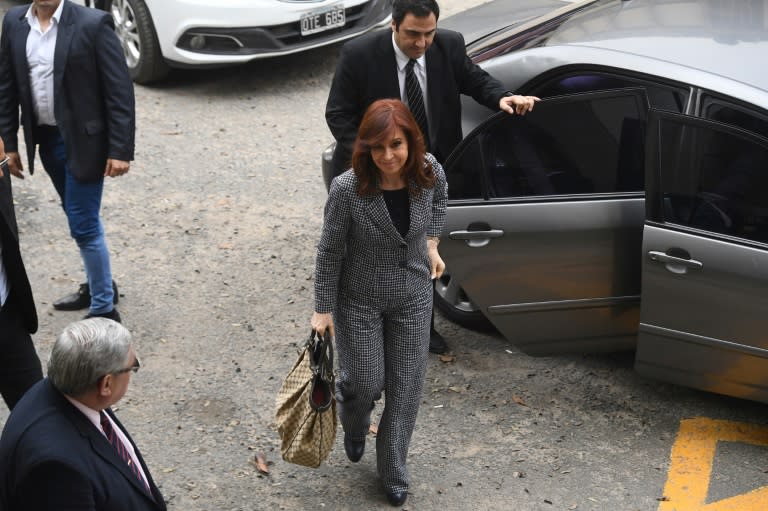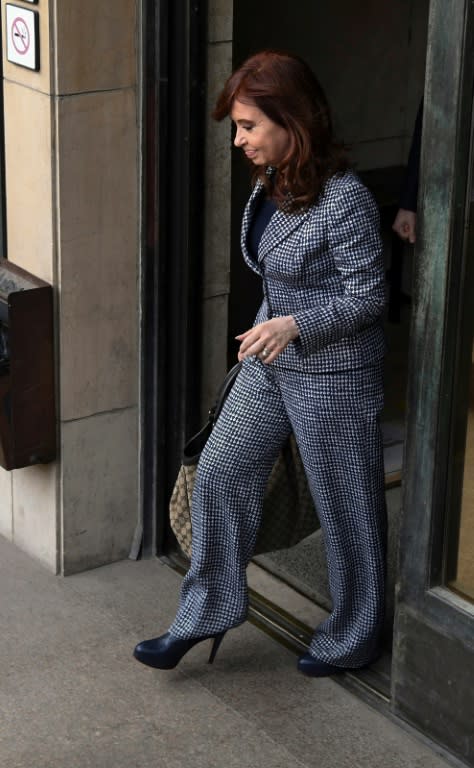Argentina's ex-president Kirchner in court over another corruption case
Beleaguered ex-president Cristina Kirchner appeared in court on Tuesday to answer questions relating to a money laundering case, a day after an Argentine judge asked that her legislative immunity be lifted. The 65-year-old, who now sits in the senate, has recently appeared twice before a judge in a separate corruption case in which she is accused of having received tens of millions of dollars in bribes. Tuesday's appearance before judge Sebastian Casanello is related to a case known as "the K-money route" relating to $60 million dollars of capital allegedly expatriated and then repatriated in an attempt to legitimize it. "Not only do I know nothing about this transaction but there is no evidence that links me to it," said Kirchner in a written submission to Casanello. The money was allegedly moved around between 2010 and 2013, while the center-left Kirchner was president, having succeeded her late husband Nestor in 2007. The case centers around a former bank cashier called Lazaro Baez, who created a business empire in Santa Cruz, some 2,500-kilometers (1,500-miles) south of the capital Buenos Aires, where he won tenders for oil and public works during the Kirchners' presidencies from 2003 to 2015. Baez owns 25 ranches comprising 400,000 hectares in the southern Patagonia region, as well as dozens of properties and landholdings. Ten days ago, one of his properties was excavated in search of buried containers believed to be full of money, but nothing was found. A defiant Kirchner said in her statement that authorities could track her movements, tap her telephone calls and "dig up the whole of Argentine Patagonia" because "they will never find anything to implicate me as I never took any illicit money." - 'Unprecedented' - Kirchner said nothing to the press throngs outside the court in the Comodoro Py neighborhood but stated on Twitter that it was her eighth appearance before a judge, describing her situation as "unprecedented." Her last two audiences with judge Claudio Bonadio related to the "corruption notebooks" scandal in which a ministerial chauffeur kept meticulous records of millions of dollars of bribes paid by businessmen to government officials to win public works contracts. Bonadio asked on Monday that Kirchner's immunity be lifted so she can be remanded in custody. Argentina's Senate voted last month to partially lift Kirchner's parliamentary immunity so her three luxury homes could be searched for evidence that she took bribes. As a senator, she retains immunity from imprisonment, although not from prosecution. The "corruption notebooks" case has implicated more than a dozen former government officials and 30 elite businessmen. Prosecutor Carlos Stornelli has said a total of $160 million in bribes was handed over between 2005 and 2015. Kirchner is under investigation in seven corruption cases in total, but claims she is the victim of "judicial persecutions" aimed at derailing her bid to run for a third presidential term in next year's elections. She has compared her lot to that of Brazil's jailed leftist ex-president Luiz Inacio Lula da Silva, currently serving 12 years for having accepted a seaside apartment as a bribe. As the opposition's leading candidate, Kirchner has been commanding 30 percent approval ratings in opinion polls.



